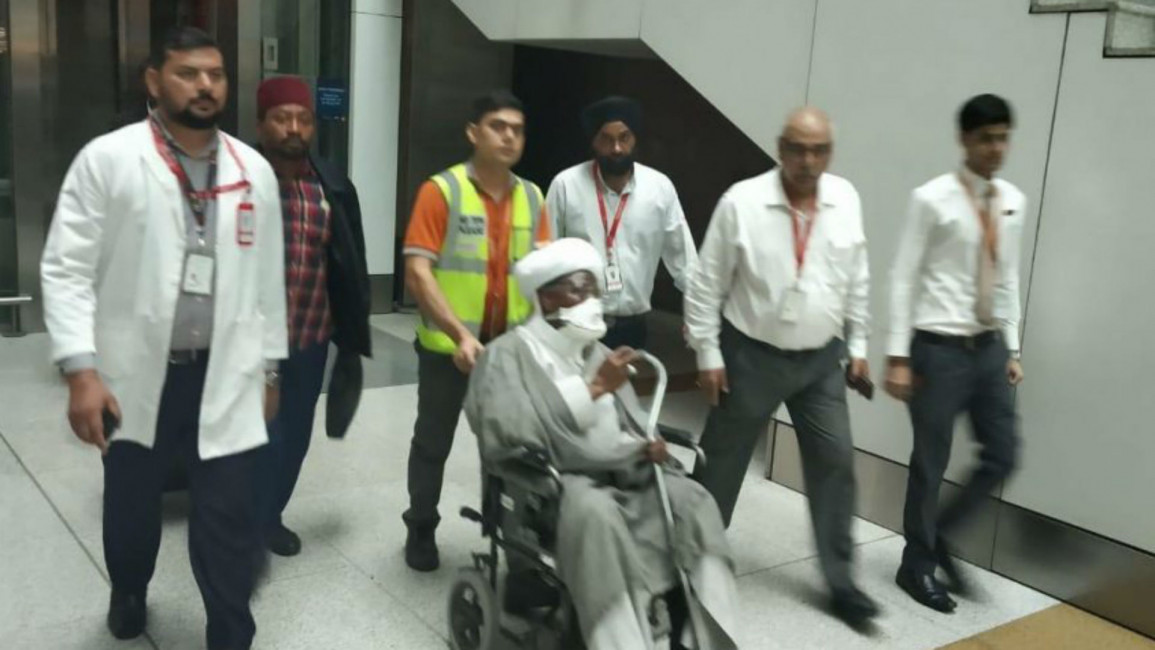Nigerian Muslim Shia leader Zakzaky leaves India hospital after 'despicable mistreatment'
The leader of the Islamic Movement in Nigeria (IMN) had been in custody in Nigeria along with his wife Zeenah Ibrahim since their arrest in December 2015 after violence that saw the army kill some 350 of his followers.
On Monday the cleric and his wife departed Nigeria to receive medical treatment in India but an official from the Medanta hospital in Gurgaon outside New Delhi told AFP that he had left the clinic late Thursday.
A statement from his office on Twitter on Thursday said he was due to take off from the Indian capital at 10:00 pm (0430 GMT) bound for Nigeria but there was no immediate confirmation that he had left.
“Sheikh Zakzaky and his wife were consistently denied access to their medical team, denied access to their lawyers and denied access to their advocates and friends,” a statement published by the Free Zakzaky Global Campaign, which has been protesting for his release from Nigerian prison, said on Thursday.
“They were treated like criminals since the moment they arrived in India, such that Sheikh Zakzaky was not permitted to move freely within the hospital and the couple were surrounded by armed officers. We are especially disappointed with Indian authorities that allowed such mistreatment to take place at the hands of the Nigerian security forces. This entire ordeal has been despicable to say the least,” the statement added.
Fears over the couple's health had fuelled a wave of recent protests in Abuja that descended into bloodshed after a brutal crackdown from security forces.
A court last week granted permission for them to receive medical care in India under Nigerian government supervision.
But the authorities insisted they must return to Nigeria to stand trial once their treatment is completed.
Gunned down
Zakzaky, in his mid-sixties, was arrested in 2015 after the violence in the northern city of Zaria that saw hundreds of his supporters gunned down by security forces and buried in mass graves.
The cleric's lawyers say he has lost his sight in one eye, is on the verge of going blind in the other and still has bullet fragments lodged in his body from the violence. His supporters say he has suffered a series of minor strokes.
A court in 2016 ordered the release of Zakzaky and his wife - but the authorities refused and filed charges against him including homicide.
Supporters held almost daily protests in Abuja in recent months pushing for his release as fears mounted about his health condition. Protests also sprouted across major cities around the world, including London where demonstrators have camped outside the Nigeria High Commission 24/7 for a total of 33 days.
At least eight people, including six protesters, a senior police officer and a trainee journalist, were killed during clashes in Abuja on July 22. The IMN said 20 of its members were shot dead.
The Nigerian government officially outlawed the group late last month in a move that sparked fears of a harsher clampdown.
After the ban, the country's police chief labelled anyone associated with the group an "enemy of the state" and called on the public to help track down its members.
The cleric and his group, which emerged from a student movement in the 1970s, have been at loggerheads with the authorities for years because of calls for an Iranian-style Islamic revolution in Nigeria.
Shias make up a small minority in predominantly Sunni Muslim northern Nigeria. Estimates put their numbers at around four million in a national population of about 190 million.
Follow us on Twitter: @The_NewArab



